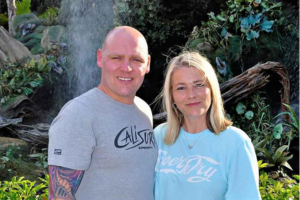A little bit about Tina and her foster child
Tina, aged 40, is a single parent based in Chester. She currently fosters a six and half year-old neurodivergent child alongside her role in litigation.
The child she currently fosters has been in her care since he was four years old. He has autism, severe trauma, PDA, developmental delay and other neurological sensory and processing difficulties, resulting in him dealing with strong feelings, anxiety and past rejection. Otherwise, he’s a happy little boy who loves going to school, riding his scooter and playing basketball.
Tina started fostering as she felt that she wanted to help children with additional needs and also to give back and make a difference in society. She specialises in fostering neurodivergent children, even receiving a Special achievement award for the progress she has made with her foster children to date.
Overcoming the challenges of raising a neurodivergent child
Tina described the changes she has made since starting to look after a neurodivergent child. Her life looks different now and she spends any spare time she might have researching neurodiversity and how it might affect a person’s day-to-day life.
She said: “I’m listening to podcasts, reading and researching relevant topics at night or whenever I can squeeze it in. I am constantly looking at opportunities to enhance my knowledge in relation to neurodiverse children and their needs and strategies to apply in everyday life. Even armed with a lot of knowledge and resources beforehand, you will need to learn to apply different techniques depending on what works for the child at that particular time to meet their needs. The motto is: do not give up on them!”
She also spoke about how it affects her emotionally:
“You have to be resilient in a lot of ways. You have to be fully invested in what you are doing and your emotional well-being needs to be pretty solid. If you think you can make a difference in someone else’s life, then go for it.”
Rewards of fostering a child with complex needs
Despite its challenges, Tina loves being a foster parent and encourages more people to take up the career.
“I’ve had so many positive experiences when it comes to fostering,” she said. “I think that every day can become brighter and more positive when you get back what you give. If you’re giving and showering your children with love and affection and then you receive it back, you must have done something right!”
“It’s the little things that matter, like the child getting excited to make you a Mother’s Day card or hugging you goodbye at the school gate, walking through the school door but then turning round and running back to you, as they wanted to give you another hug.
She also spoke about helping a non-verbal child to speak and read.
“I had a child come to me who wasn’t fully verbal, maybe a couple of words here and there. We mostly used Makaton [a language of signs and symbols used to help people with disabilities communicate] and constant support and learning, but within six months, he was able to create sentences independently and had a level of speech and understanding that no one thought he’d ever get to. It’s been challenging but incredibly rewarding to see him speak and form sentences without the imminent need for visual aid.”
Improving awareness of neurodiversity
Tina also chatted about the difficulties that parents of neurodivergent children can face, as well as how we can reduce the stigma that can affect the lives of neurodiverse families and communities. Schools and other organisations (medical and educational) often underestimate the needs of these children due to their lack of knowledge or experience with these sorts of conditions. Tina believes symptoms are often overlooked and therefore, children do not get the extra support they need whether it is at home or in their setting.
“Sometimes it’s hard to get support from schools. It’s like as soon as they walk through the school door, they are a different child. Neurodivergent children often ‘mask’ as school or in public and don’t let their guard down until they’re home or back in their safe spaces.”
“Like any child, my child has his moments. At school, he tends to listen well and will do as he’s told but as soon as he’s home, he can sometimes act out and he can get very emotional. When he’s at home, he feels safe enough to show how he’s really feeling.”
Could you help transform a life by fostering?
Tina understands that fostering isn’t for everybody, especially fostering children with additional needs. She said: “I’d be lying if I said fostering hasn’t affected me, it has affected my life on every level, but it’s also shown me how life can change for children in care and that we all can make a small difference by simply loving them as our own.”
“With the right care, love and support and the right strategies, neurodivergent children can thrive. Children in care settings, particularly neurodivergent ones, can lose faith in adults and the system. It’s our job as foster parents to restore their faith, and this has been my goal since I became a foster parent.”
Related Post
Foster carer caser study: Lyndsay & Daniel
About Lyndsay and Daniel Married couple Lyndsay and Daniel,


